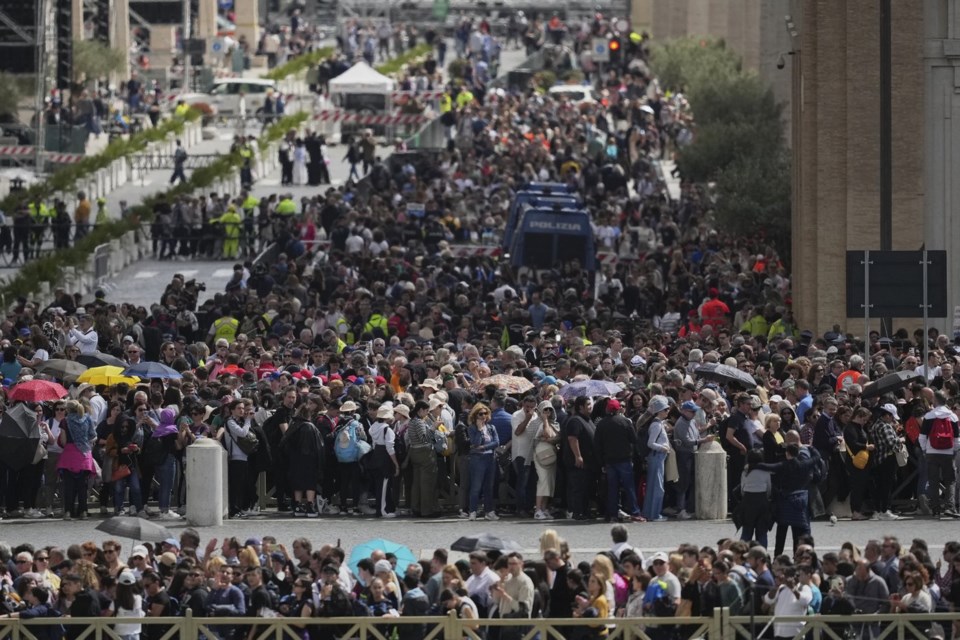OTTAWA — Canada's ambassador to the Holy See says the Vatican will be the capital of the world Saturday during the funeral of Pope Francis, who earned the respect of vastly different people.
"Rome will indeed be caput mundi, or the capital of the world," Joyce Napier told The Canadian Press in an interview from Rome on Friday, where a "quiet, constant line-up" of people came to pay their respects.
"You have to ask yourself: who else, what other person would have drawn that kind of crowd."
The Vatican says 250,000 mourners visited Pope Francis's remains at a basilica over the course of three days, ahead of Saturday's funeral.
Napier said Canadian dignitaries will sit alongside 135 delegations, including 50 heads of state, at a gathering of a range of nationalities and viewpoints that few other people could bring together.
Gov. Gen. Mary Simon is leading Canada's delegation alongside her husband Whit Fraser and Senate Speaker Raymonde Gagné.
Major Indigenous leaders from Canada will attend, as will all five Canadian cardinals, various bishops, provincial representatives and Supreme Court Chief Justice Richard Wagner.
Napier said Pope Francis made a real effort to advance reconciliation, most famously by visiting Alberta, Quebec and Nunavut in 2022 to apologize for the Catholic Church's role in residential schools.
He also received Indigenous representatives at The Vatican for hours, and had some artifacts returned to nations in Canada.
"Not many get to spend that long and that much time with the Holy Father," she said. "There is a special relation between this pope and Canada, between this pope and our Indigenous communities."
Pope Francis named himself after St. Francis of Assisi, who is known for his humility. Napier noted that the pope gave his first public address with an informal "good evening" and his first trip was to Lampedusa, an Italian island where thousands of migrants arrive on shantyboats from African countries.
He proceeded to speak often about the poor, women suffering abuse, and minorities facing persecuted including LGBTQ+ people, Napier said. The pope had showers, clinics and food services set up for homeless people when he learned they were living in the colonnade around the St. Peter's Square.
In 2018, Pope Francis riled locals during a visit to Chile by dismissing a journalist asking about a sex-abuse scandal. But he then apologized, commissioned an investigation and cleared house of the country's Catholic leadership.
This past Easter, he went to a prison to speak with inmates, expressing regret that he wasn't well enough to wash their feet as he had done ceremoniously in past years.
"He started his papacy that way, and he finished it that way," she said. "He decided to sort of demystify, and make the church more accessible, more open."
Napier says she had an upfront view of the humility that Pope Francis brought to the role.
She met him last June to present her credentials, a standard procedure for ambassadors in any posting.
She arrived early, and Pope Francis was waiting. She had brought a black lace veil called a mantilla, which women traditionally wear when meeting the pope, and was fretting over whether to put it on or just walk in.
"He doesn't care; you come in as you feel comfortable," an usher told her.
She recalled the pope being curious about the relatives she brought, listening to what they had to say and having a good sense of humour.
"It was so easy. I thought it would be so difficult, but the conversation just flowed," she said. The pope walked with a cane at that point.
Seven months later, he spent most of his time sitting, having trouble speaking at a Jan. 9 meeting with foreign ambassadors and letting an aide read out his speech.
"It would be good not to lose sight of the pope's message. It was a message of peace, and it was a message of fraternity, of compassion," she said.
"The world has lost that voice. And even if it was a voice that sometimes irritated world leaders, even if it was a voice that many people didn't necessarily agree with."
The Vatican says its foreign relations are among the oldest on the planet, opening a diplomatic mission around 1500 AD and sending envoys to other states as far back as 325 AD.
Napier said the tiny state doesn't have trade or official policies, but it does have widespread influence through its diplomatic relations with 184 states, including Iran, Russia, Israel and Palestine. She's been surprised at how open the Vatican is to hearing from herself and colleagues from around the world.
The Church also runs a network of hospitals and schools in numerous countries, which helps gives the Holy See an on-the-ground perspective of major crises.
"It is a state like no other; so small in geographical size and square metres, but with an influence that is far beyond their size," said Napier.
"They have a huge network, and a huge amount of information on places that are of interest to everybody."
The former CTV journalist leads a team of four with decades of experience in the Vatican's functioning. The mission helps Canada learn what's happening in hard-to-reach spots, and to maintain contact with countries with which Ottawa has little or no diplomatic contact.
The mission also helps Canada try to advance progressive issues that have rankled Vatican leadership, despite Pope Francis starting to "open the door," particularly on blessings for same-sex couples and saying he can't judge LGBTQ+ people, she said.
Abortion and medical assistance in death are major sticking points, Napier said, as is the role of women in the Church.
"There are issues where Canada and the Vatican don't see eye to eye," she said, though she said the two have shared views on refugees, climate change and artificial intelligence.
"There are many issues where we can have fruitful dialogue."
This report by The Canadian Press was first published April 25, 2025.
Dylan Robertson, The Canadian Press



